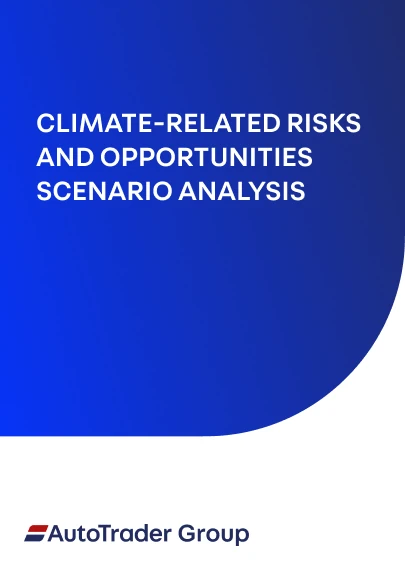Close
Back
TCFD
reporting
Climate change and how we are
responding to the risks and opportunities
that it poses are at the forefront of the
minds of our investors, regulators and
other stakeholders of our business.


We support the Task Force on Climate-related Financial
Disclosures (‘TCFD’) and its recommendations and are
committed to assessing the impacts of climate risks and
opportunities across our operations and supply chains.
Governance
We have integrated climate governance into our existing governance processes
and sought to embed responsibility for the risks associated with climate change
throughout our business, adopting a climate change focused mindset.
There is a clear commitment from the Board to deliver on our environmental
commitments and ensure relevant accountability across the business.
Our environmental strategy was initiated to ensure a joined up approach across the business considering the risks and opportunities climate issues pose and how we are responding to them.
Our climate
governance
framework

The Corporate Responsibility Committee is responsible for holding the Executive Directors to account with respect to climate risks and opportunities and their impacts on both the business and the wider environment. Our environmental strategy is a standing agenda item for all Committee meetings.
The responsibility for assessing and managing climate related risks and opportunities sits at both Executive and Board level. Executive responsibility for our impact on climate change is held by all our Executive Directors, who have responsibility for overseeing our environmental strategy. Responsibility for the consideration of climate related risks and opportunities on the financial performance of the Group and compliance with environmental reporting sits with our CFO, Jamie Warner.
Our Risk Forum undertakes a review of climate related risks with our Auto Trader Leadership Team (‘ALT’).
Environmental risks are also reviewed at least twice a year as part of the overall risk review process.
The Committee introduced ESG-related targets into the Performance Share Plan (‘PSP’) for the first time in 2021. The PSP includes a specific performance target linked to a reduction in our GHG emissions.
Our GHG emissions have been independently assured by EcoAct using ISO 14064-3 for all scopes
of our carbon footprint.
Our environmental strategy not only focuses on our own environmental impact, but also aims to support our customers, consumers and the industries in which we operate and, as a result, various parts of the business play a part in delivering our ambitions. Different parts of the business are brought together through our Environmental Strategy working group, which is sponsored by members of our ALT. Key activities and milestones are set for each financial year and these are shared with the Corporate Responsibility Committee. The Environmental Strategy working group is responsible for our commitment to net zero, which is in line with our SBTi targets. This group also identifies ways in which we can support the tech and automotive industries, alongside helping consumers make more environmentally friendly vehicle choices.
Our employees play a fundamental role in the success of our environmental strategy. Our Sustainability Network comprises passionate individuals from across the business who are focused on making life at Auto Trader more sustainable. They do this through increasing employee awareness and driving impactful changes for both individuals and our business, supporting our overall goal of reducing our carbon emissions.
Strategy
Our strategy is ‘Putting the brakes on carbon’, not only across our own operations and supply chain, but also by using our capabilities and voice to influence the automotive and technology industries to support others in the transition to a low carbon economy.
As the world transitions to a low carbon economy, regulatory change and changes in consumer behaviour will have an impact on the automotive and technology industries, meaning we need to continue to develop and adapt our business strategy to incorporate climate resilience. Reducing the impact our business has on the environment is embedded into our wider business strategy of acting responsibly and we are committed to being a net zero business by 2040.
Climate-related risks and opportunities
To build climate resilience into our business strategy we identify climate related risks and opportunities. Environmental risks are reviewed regularly as part of our overall risk review process and we maintain an environmental risk register which monitors key changes and actions taken to manage the risks identified.
As an online marketplace, we have a relatively small carbon footprint and our business model is sustainable in a low carbon environment. However, the automotive industry is intrinsically linked with climate change and there is pressure from consumers and Government for the industry to reduce its impact on the environment. The nature of the risks and opportunities that we face depends not just on the physical aspects of climate change, but also on transition risks. These are driven by the trajectory of our customers and consumers in responding to climate change and the regulations applied to the market we operate in.
Our climate related assessment of the risks and opportunities posed by climate change and how they might impact our business has provided a firm foundation on which to build our environmental strategy and resilience. We considered the transitional and physical climate risks and opportunities presented by rising temperatures, climate related policy and emerging technologies.
We agreed the methodology for assessing and quantifying financial impacts. For the purposes of our assessment, the time horizons we used were aligned to our business planning cycle as follows:
• Short term: 0–5 years
• Medium term: 5-10 years
• Long term: 10 years +
In each case, the likely impact on costs or revenues was reviewed. We have assessed how the risks can be better managed, reduced or mitigated in line with the Group’s risk management framework and business strategy. The risks identified during our analysis are more likely to present themselves in the medium or long term.
Having assessed and modelled the risks, we believe that there is no immediate material financial risk or threat to our business model. Even though there is uncertainty around the time horizon over which climate risks will materialise, stakeholder expectations and regulatory attention could develop at pace, impacting the rate at which the business may need to cut carbon emissions.
We recognise that we will need to keep abreast of future climate change legislation as well as consumer preferences and retailers’ ability to adapt. However, we have a strong track record of quickly evolving.
Climate-related risks and
opportunities scenario analysis
We have undertaken scenario analysis to measure the potential
financial impact of the and risks and opportunities identified,
taking into consideration different climate-related scenarios.

Metrics and targets
Methodology
The Group is required to report its energy use and measure and report its direct and indirect greenhouse gas (‘GHG’) emissions by the Companies (Directors’ Report) and Limited Liability Partnerships (Energy and Carbon Report) Regulations 2018. The GHG reporting period is aligned to the financial reporting year.
Reported energy and GHG emissions data is compliant with SECR requirements and has been calculated in accordance with the GHG Protocol and SECR guidelines.
The methodology used to calculate emissions is based on the financial control consolidation approach, as defined in the Greenhouse Gas Protocol, A Corporate Accounting and Reporting Standard (Revised Edition). Emission factors used are from the UK Government’s GHG Conversion Factors for Company Reporting, and selected other emissions factors datasets as applicable, for the year reported.
Independent verification of our GHG emissions
EcoAct has independently assessed and verified Auto Trader’s GHG emissions following verification standard ISO 14064-3:2019. Based on the data and information provided by Auto Trader and the processes and procedures followed, nothing has come to EcoAct’s attention to indicate that the GHG emissions totals for all years reported are not fairly stated and free from material error.
Risk management
The Board is collectively responsible for determining the nature and extent of the principal risks which may impact the business.
Our risk management process approach allows for the continual identification and assessment of climate related risks. We maintain an environment/climate risk register which is reviewed regularly by the risk register owner, their delegates, and our risk management team. Each climate related risk is assigned an owner and controls and/or mitigating actions are recorded against each risk.
Our risk management framework, including the processes for identifying,
assessing and managing risk, is set out in the Risk management section
of this website.
Our operations
Our strategic ambition is to minimise our impact on the environment, thereby protecting our business from the impact of climate change. Our aim is to be net zero by 2040.
Read MorePartnering with our industries & influencing Government
Our aim is to influence the UK Government, and partner with and support the automotive and technology industries in their own transition towards a low carbon economy.
Read MoreSupporting consumers
Our aim is to support consumers to make more environmentally friendly vehicle choices.
Read More
Sign up to our email alerts service:
Join our news & views mailing list
or submit media-related enquiries: